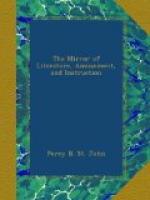There never, perhaps, was a better stage-figure than that of Mrs. Siddons. Her height is above the middle size, but not at all inclined to the em-bon-point. There is, notwithstanding, nothing sharp or angular in the frame; there is sufficient muscle to bestow a roundness upon the limbs, and her attitudes are, therefore, distinguished equally by energy and grace. The symmetry of her person is exact and captivating. Her face is peculiarly happy, the features being finely formed, though strong, and never for an instant seeming overcharged, like the Italian faces, nor coarse and unfeminine under whatever impulse; on the contrary, it is so thoroughly harmonized when quiescent, and so expressive when impassioned, that most people think her more beautiful than she is; so great, too, is the flexibility of her countenance, that the rapid transitions of passion are given with a variety and effect that never tire upon the eye. Her voice is naturally plaintive, and a tender melancholy in her level speaking denotes a being devoted to tragedy; yet this seemingly settled quality of voice becomes at will sonorous or piercing, overwhelms with rage, or in its wild shriek absolutely harrows up the soul. Her sorrow, too, is never childish—her lamentation has a dignity which belongs, I think, to no other woman: it claims your respect along with your tears. Her eye is brilliant and varying like the diamond; it is singularly well placed; “it pries,” in Shakspeare’s language, “through the portal of the head,” and has every aid from brows flexible beyond all female parallel, contracting to disdain, or dilating with the emotions of sympathy, or pity, or anguish. Her memory is tenacious and exact—her articulation clear and distinct—her pronunciation systematic and refined.
Nor has Nature been partially bountiful: she has endowed her with a quickness of conception, and a strength of understanding equal to the proper use of such extraordinary gifts. So entirely is she mistress of herself, so collected, and so determined in gestures, tone, and manner, that she seldom errs, like other actors, because she doubts her powers or comprehension. She studies her author attentively, conceives justly, and describes with a firm consciousness of propriety. She is sparing in her action, because English nature does not act much; but it is always proper, picturesque, graceful, and dignified: it arises immediately from the sentiments and feeling, and is not seen to prepare itself before it begins. No studied trick or start can be predicted;—no forced tremulation of the figure, where the vacancy of the eye declares the absence of passion, can be seen;—no laborious strainings at false climax, in which the tired voice reiterates one high tone beyond which it cannot reach, is ever heard;—no artificial heaving of the breasts, so disgusting when the affectation is perceptible;—none of those arts by which the actress is seen, and not the character, can be found in Mrs. Siddons. So natural are her gradations and transitions, so classical and correct her speech and deportment, and so intensely interesting her voice, form, and features, that there is no conveying an idea of the pleasure she communicates by words. She must be seen to be known. What is still more delightful, she is an original: she copies no one living or dead, but acts from nature and herself.




